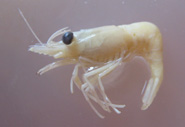Ocean noise importance rises as scientists discover more species that use sound
Bioacoustics, Effects of Noise on Wildlife, Ocean, Science, Shipping Add commentsA new study reveals yet another family of ocean life previously thought to be deaf actually use sound to avoid potentially dangerous areas. It’s the latest fascinating study from a collaboration between British and Australian scientists that has been revolutionizing our understanding of the role of acoustic ecology in reef habitats. In this study, crustaceans that feed on plankton avoided reef sounds; such reefs are home to fish that would enjoy a crustacean lunch.
 Many such small crustaceans are foundations of vast ocean food webs. Co-author Dr Andy Radford, who is leading a major project in Bristol to investigate the impact of anthropogenic noise on marine animals, said: “This highlights just how damaging the impacts of human noise pollution may be for so many different creatures. Chronic noise from shipping, drilling and mining may mask crucial natural sounds, causing animals to make poor or even fatal decisions, which in turn will threaten vital fisheries and tourism resources.”
Many such small crustaceans are foundations of vast ocean food webs. Co-author Dr Andy Radford, who is leading a major project in Bristol to investigate the impact of anthropogenic noise on marine animals, said: “This highlights just how damaging the impacts of human noise pollution may be for so many different creatures. Chronic noise from shipping, drilling and mining may mask crucial natural sounds, causing animals to make poor or even fatal decisions, which in turn will threaten vital fisheries and tourism resources.”
Coral reefs are noisy places, and this noise can be an important cue for animal orientation. Dr. Steve Simpson is quoted in a University of Bristol press release: “The combination of clicks, pops, chirps and scrapes produced by resident fish, snapping shrimp, lobsters and urchins can be detected with our hydrophones from many kilometres away. Our research has already found that reef noise is used by the larvae of fish and even corals to locate and select habitat after their early development in the open ocean, but using noise to avoid reefs, that is a first.”
The mechanism of hearing in these tiny creatures is poorly understood, although co-author Dr Andrew Jeffs and his group from the University of Auckland have found that both tropical and temperate water crabs and lobsters are attracted by the noise of their adult habitat. Dr Jeffs said: “It is clear that some crustaceans use sounds for orientation, and that noise can induce a downward-swimming response. But this study throws wide open our understanding of crustacean hearing, and much more research is now needed to understand how and what these little critters can hear.”
